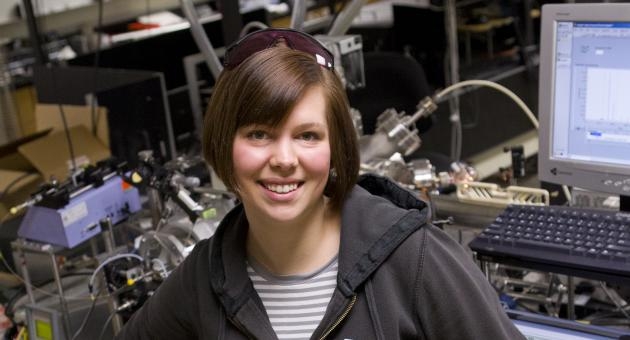Chemistry major reflects on days of wine and lasers

As a Temple freshman in 2008, Laine Radell wanted to try everything she could academically, because she wasn’t sure what she wanted to study. She took an inaugural course on the chemistry of wine for non-science majors and quickly knew that her future was in science.
“I loved it,” said Radell, a native of Clarks Summit, Pa. “There were concrete explanations for why things happen — why wines tasted bitter or sweet and why they did or did not develop a color. To learn those explanations really pushed me toward chemistry.”
Radell declared chemistry as her new major, but she soon wanted to learn more than she was getting from her textbooks.
“You walk around Beury Hall, which houses the Chemistry Department, and you see all these posters highlighting people’s research, and it’s nothing you are learning in the textbooks,” said Radell, who is receiving a bachelor of science in chemistry.
At the beginning of her sophomore year, Radell’s advisor steered her toward Chemistry Chair Robert Levis, a pioneer in strong field chemistry and director of Temple’s Center for Advanced Photonics Research, who, coincidentally, also taught the chemistry of wine course.
“The next day, I showed up at Dr. Levis’ lab and started helping out with whatever I could,” Radell said.
Over the next three years, Radell assisted graduate students, postdoctoral students and researchers in Levis’ group in conducting experiments investigating the interaction of ultra intense laser beams with biological systems. Her contributions have often been cited in research papers authored by the Levis group, including one published in the Proceedings of the National Academy of Science.
“It’s really cool to see your name on those journal articles,” she said. “It says no matter what you are doing in the lab, whether it is mixing solutions, analyzing data or just cleaning up, you are contributing to human knowledge.”
Along the way, Radell even devised a few experiments of her own, and presented her lab work at the 2010 meeting of the American Chemical Society in Philadelphia. She will also be second author on a paper currently being drafted for submission to the journal Analytical Chemistry.
Radell, who is graduating with a 3.4 grade point average, is going on to graduate school at George Washington University, where she will work under biochemist Akos Vertes, co-founder and co-director of the W. M. Keck Institute for Proteomics Technology and Applications. She hopes to pursue a career in research and even teaching.
But she will always look back fondly on her research beginnings at Temple.
“Temple made it really easy for me to pursue what I wanted to do,” she said. “It wasn’t hard for me to say 'I want to do research,' and then to actually do it.”